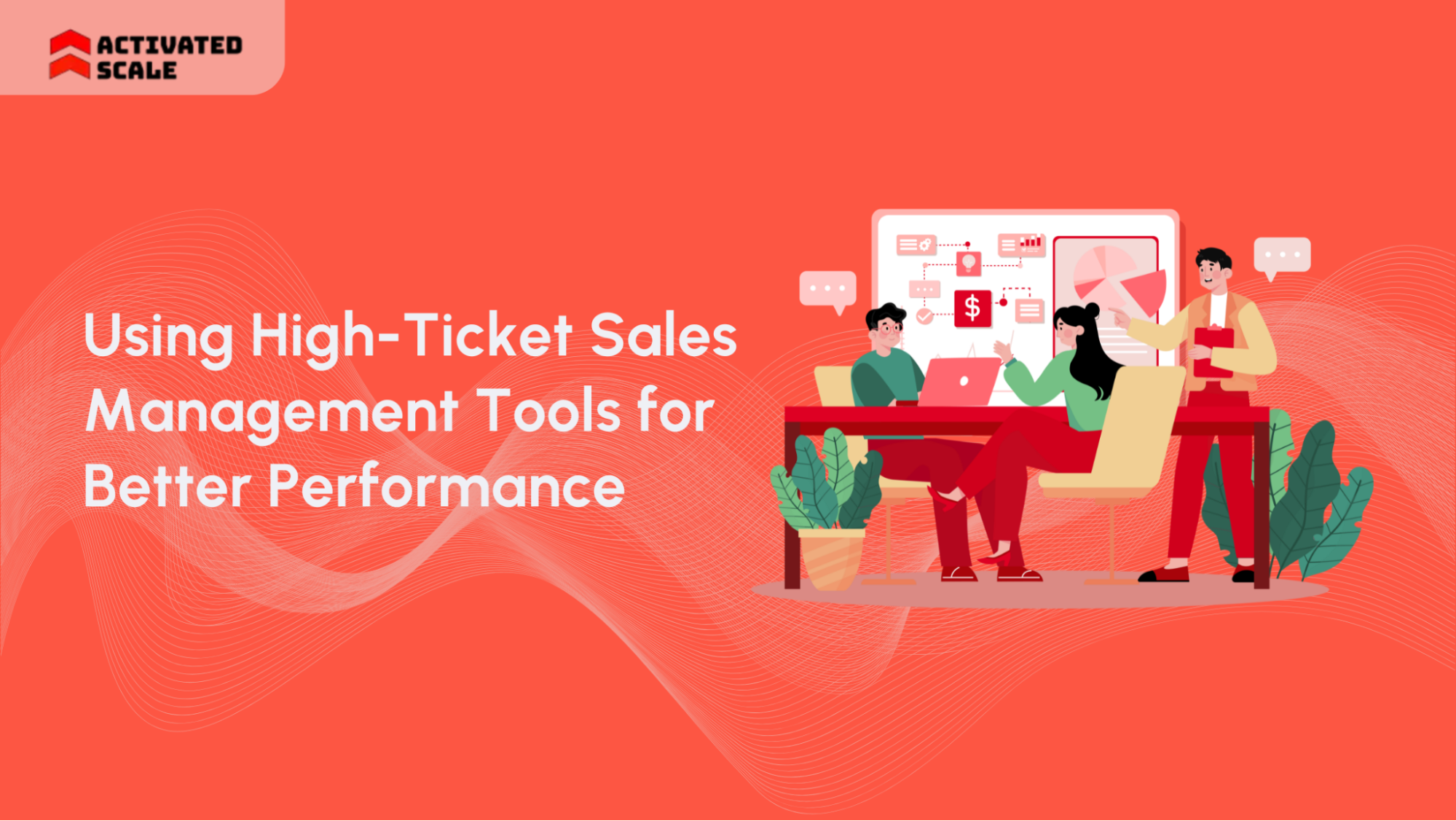Closing a deal worth thousands or even millions is very different from selling a $99 subscription. High-ticket sales take months, involve multiple people, and carry much higher stakes.
Big B2B deals often include 6 to 10 decision-makers. These long sales cycles can stretch over several months, so they need careful planning to keep everything on track.
Accuracy and personalization make all the difference. Companies using AI-driven personalization can cut customer acquisition costs by up to 50%, while hyper-personalization can increase revenue by 10% or more.
Handling such complex processes requires the right tools. High-ticket sales management tools help organize workflows, keep stakeholders engaged, and provide insights that make decisions easier. This article explores how these tools can improve performance and lead to better results in high-value sales.
Key Takeaway
- Complex Deals Require Structure: High-ticket sales involve long cycles, multiple decision-makers, and high stakes, making organization and tracking essential.
- Tools Drive Efficiency: CRMs and sales management platforms centralize communication, track proposals, provide data insights, and enable personalization.
- Right Features Matter: Real-time tracking, AI insights, and customizable workflows help teams focus on high-value opportunities and improve conversion rates.
- Best Practices Boost Results: Segmentation, thoughtful automation, continuous training, and performance monitoring turn tools into actionable results for high-ticket deals.
What Makes High-Ticket Sales Unique?
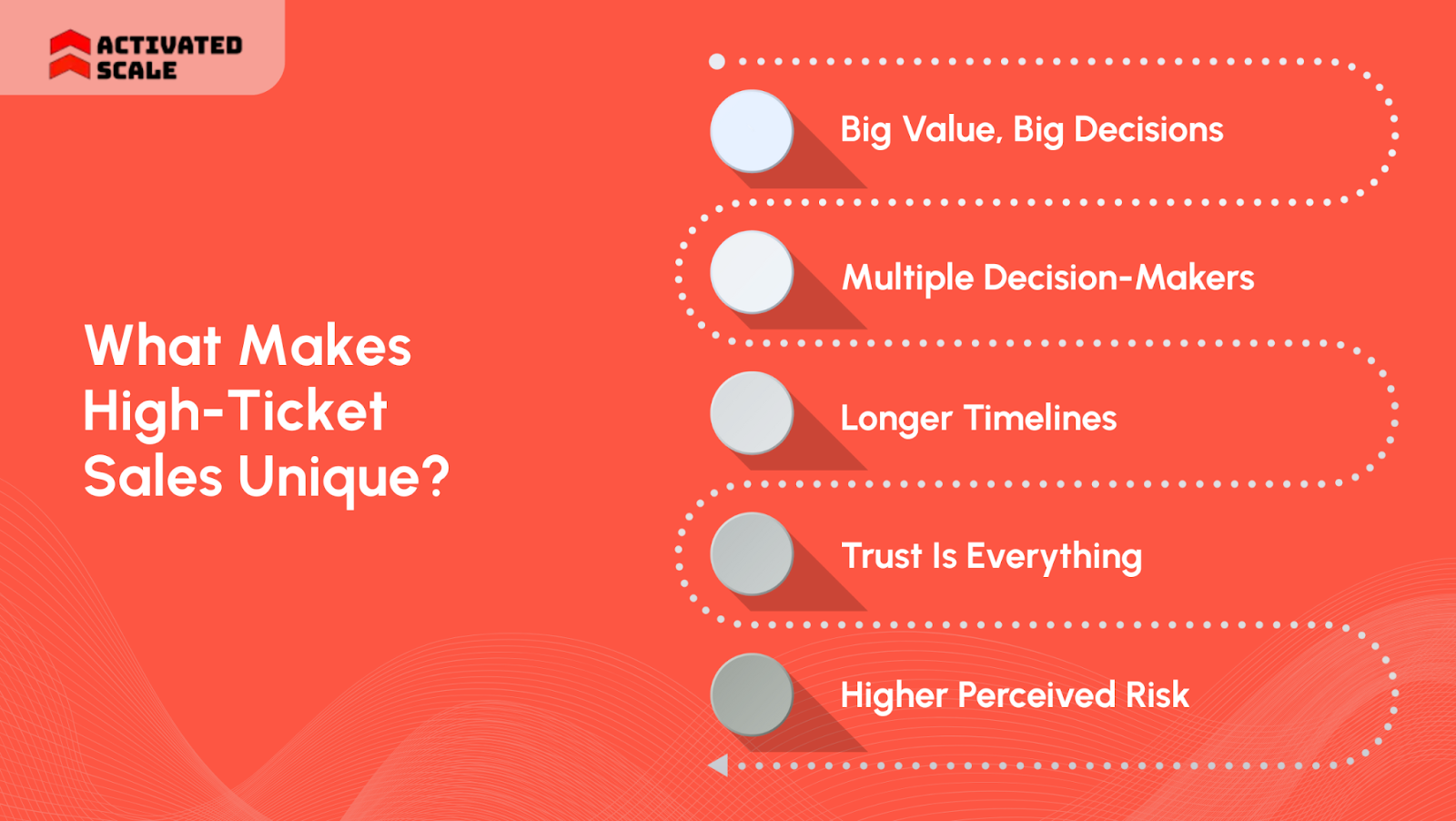
High-ticket sales are not your everyday transactions. They involve big investments, careful decision-making, and a lot more at stake than a typical purchase. Here’s what makes the high-ticket sales process stand out:
- Big Value, Big Decisions: These deals often involve thousands (or even millions) of dollars. Buyers want to be sure every penny is worth it.
- Multiple Decision-Makers: It’s rarely just one person signing off. Teams of stakeholders, each with their own concerns, weigh in.
- Longer Timelines: Closing a deal can take months, sometimes over a year, because each step needs careful consideration.
- Trust Is Everything: Buyers need confidence that the investment will deliver results. Strong relationships and credibility are key.
- Higher Perceived Risk: The bigger the investment, the more cautious the buyer. Mistakes feel expensive, so decisions are slow and deliberate.
High-ticket sales are a careful dance of relationships, timing, and trust. Unlike quick, low-cost purchases, every interaction counts, and missteps can be costly.
With so many stakeholders and long timelines, relying on intuition alone isn’t enough. That’s where management tools come in, bringing clarity and structure to complex sales processes.
Why Management Tools Matter in High-Ticket Sales
High-ticket sales juggle multiple stakeholders, long timelines, and high stakes. Management tools bring clarity by centralizing data and tracking every interaction.
They keep teams aligned, highlight critical next steps, and reduce the chance of costly oversights. In short, these tools turn complexity into actionable structure, making high-value deals more manageable.
Also Read: 10 Strategies for B2B SaaS Sales Success
However, not all tools are the same. To truly support high-ticket sales, certain features are essential for organization, insight, and personalization.
4 Essential Features of High-Ticket Sales Management Tools
High-ticket sales demand precision, coordination, and insight at every stage. The right tools provide the structure and clarity needed to turn complex deals into manageable steps. Here are four essential features that make this possible:
1. Centralized Communication with CRM Integration
A solid CRM keeps every conversation, email, and note in one place. Sales teams can quickly see what’s happened with each client and plan the next step, so nothing slips through the cracks. It’s like having a single control panel for all your high-value deals.
2. Real-Time Proposal Tracking and E-Signatures
Knowing exactly where a proposal stands saves time and stress. Teams can see if a document is viewed, pending approval, or signed. E-signatures mean approvals happen instantly, keeping deals moving without waiting on paperwork.
3. Actionable Data Insights
Numbers tell stories that opinions can’t. Tools that analyze client behavior, deal progress, and trends help teams make smarter moves, anticipate challenges, and focus on the opportunities most likely to close.
4. Personalization Capabilities
Every client has unique needs, and cookie-cutter approaches rarely succeed. The best tools enable teams to craft proposals, follow-ups, and messages customized to each decision-maker, making interactions feel thoughtful and building trust faster.
Knowing which features are critical is one thing. Finding the right platforms that deliver them is another. Now, let’s look at some of the top tools that help teams manage high-value deals effectively.
7 Best High-Ticket Sales Management Tools in 2025
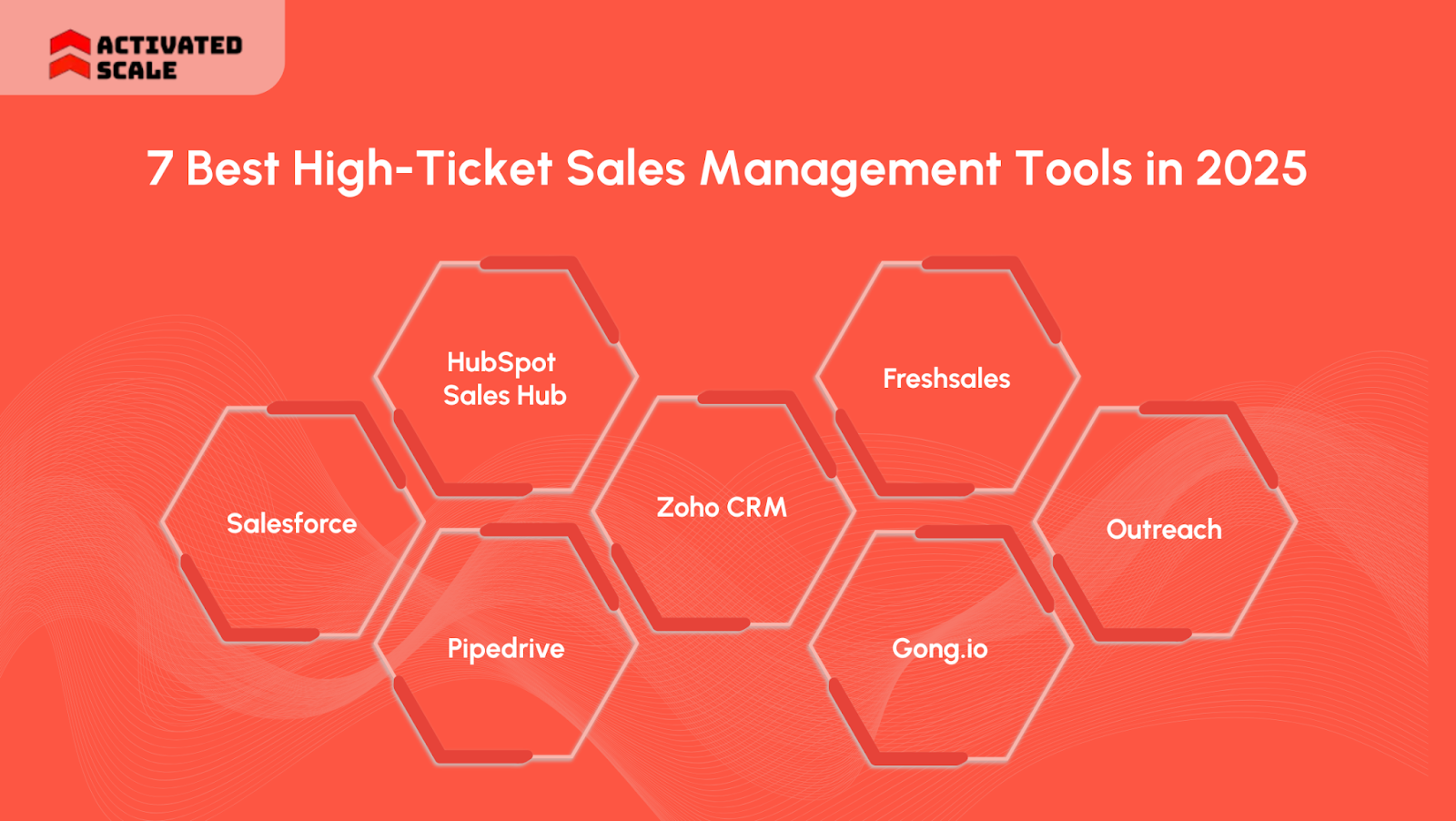
High-ticket sales demand tools that do more than just track deals. In 2025, several platforms stand out for their ability to streamline workflows, improve visibility, and support smarter decision-making. Here’s a look at the top tools:
1. Salesforce
Salesforce is the go-to powerhouse for teams managing complex, high-stakes deals. It’s like having a command center where every stakeholder, activity, and forecast is visible at a glance.
Key Features:
- Deep customization to customize workflows for multi-decision-maker deals.
- AI-powered predictions to identify which deals are likely to close.
- Centralized dashboards to track pipeline health and progress.
2. HubSpot Sales Hub
HubSpot Sales Hub shines when marketing and sales need to sing the same tune. It connects lead generation, nurturing, and deal tracking, giving teams one clear playbook.
Key Features:
- Integrated view of all customer touchpoints across marketing and sales.
- Automated lead scoring and task reminders for precise follow-ups.
- AI tools to suggest the next best action for each prospect.
3. Pipedrive
Pipedrive is built for visual thinkers. Its strength lies in showing every deal’s journey in a pipeline you can actually see and manage, keeping long sales cycles from going off track.
Key Features:
- Gain a clear overview of deal stages and progress through a drag-and-drop interface.
- Stay on top of important tasks with automated reminders and notifications.
- Define and adjust sales stages to match your specific sales process.
- Monitor key performance indicators to assess and improve sales effectiveness.
4. Zoho CRM
Zoho CRM is a versatile platform that caters to businesses of all sizes, offering a range of features to manage high-value sales effectively. Its flexibility and customization options make it suitable for diverse sales strategies.
Key Features:
- Fully customizable fields, modules, and workflows.
- AI assistant “Zia” for predictive analytics and next-step suggestions.
- Integration with email, chat, and telephony for seamless communication.
5. Freshsales
Freshsales is built for teams that combine service and sales in high-value deals. It keeps customer information centralized, allowing reps to focus on relationships rather than admin tasks.
Key Features:
- Lead scoring and AI recommendations to prioritize high-potential clients.
- Automate follow-up emails and tasks to maintain consistent communication with prospects.
- Communicate directly with prospects without leaving the platform.
- Customize the interface to display information most relevant to your sales process.
6. Gong.io
Gong.io is like a microscope for conversations. By analyzing customer conversations, it helps sales teams understand buyer intent and improve their sales strategies.
Key Features:
- Conversation analytics to uncover buyer intent.
- Coaching insights to improve messaging and strategy.
- Trend identification to spot risks or opportunities early.
7. Outreach
Outreach is a sales engagement platform that automates and personalizes communication with prospects. Its focus on efficiency and effectiveness makes it a valuable tool for managing high-value sales interactions.
Key Features:
- Automated sequences to manage multi-touch campaigns.
- Engagement analytics to track responses and adjust strategies.
- Pipeline and activity tracking to accelerate decision-making.
Also Read: The Art of Spotting Sales Talent: Key Traits to Look for in A High-Performing Sales Team
Even the best tools only work when used thoughtfully. Implementing them strategically can make the difference between stalled deals and consistent wins.
Best Practices for Using These Tools Effectively
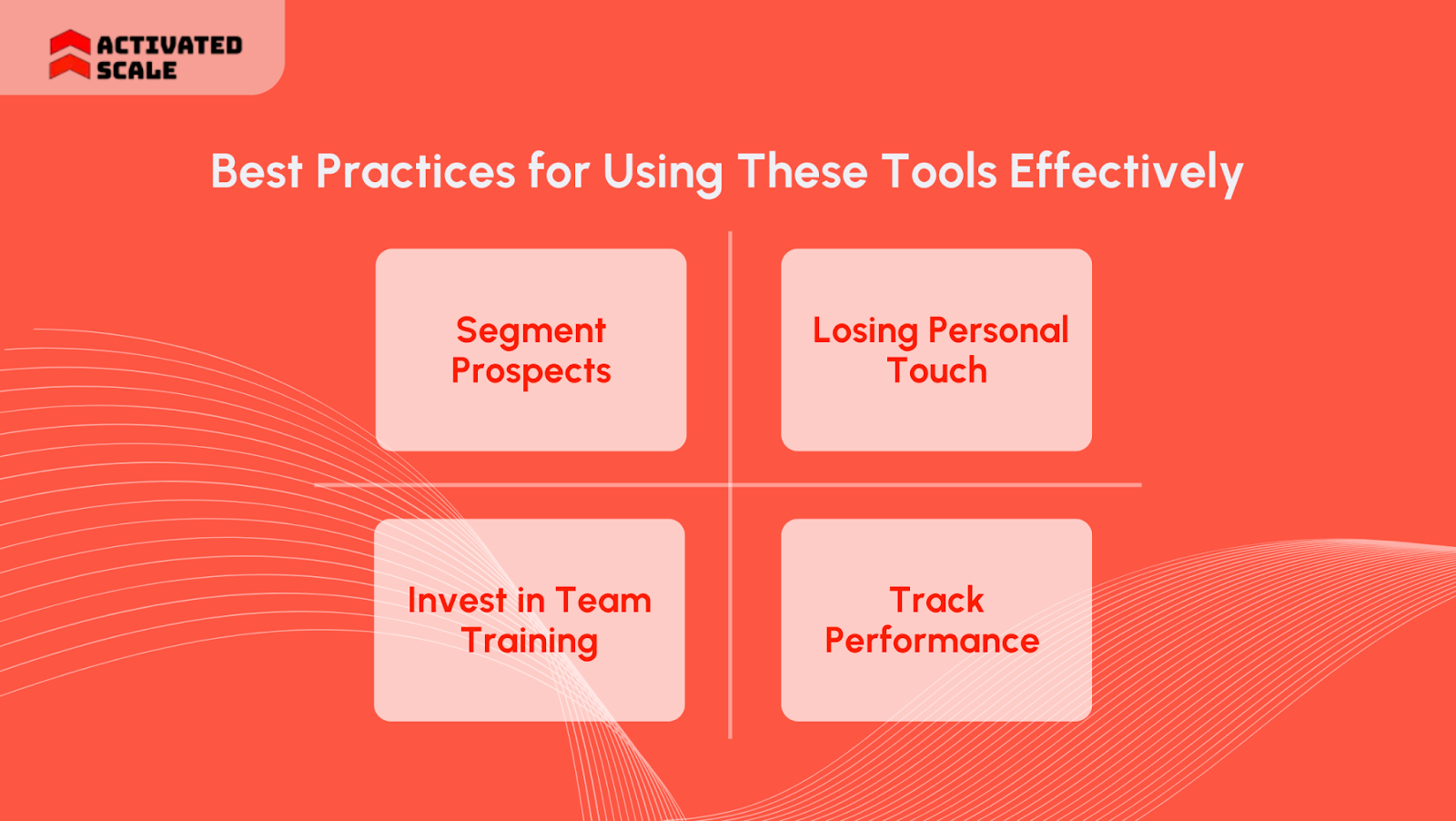
High-ticket sales tools shine when used strategically. Success comes from understanding your prospects, staying personal even while automating, training your team, and keeping a close eye on results.
Here’s how teams can put these best practices into action to maximize every high-value opportunity:
- Segment prospects thoughtfully: Break down leads by industry, company size, or decision-making level. For example, treat a CFO differently from a procurement manager; each cares about different ROI factors.
- Automate smartly without losing personal touch: Use automation for reminders and follow-ups, but personalize the messaging. A quick note referencing a previous conversation can make an automated email feel like it was crafted just for them.
- Invest in team training: Ensure every rep is confident using the tool. Short weekly sessions on new features can prevent small mistakes from slowing down big deals.
- Track performance continuously: Monitor KPIs like deal velocity, conversion rates, and pipeline health. If one stage in the funnel keeps stalling, you’ll notice early and can adjust outreach or messaging before opportunities slip away.
Tools provide visibility and structure, but they don’t close deals on their own. Combining the right platforms with skilled sales professionals is what turns insight into revenue.
Turning Tools into Outcomes with the Right Sales Talent
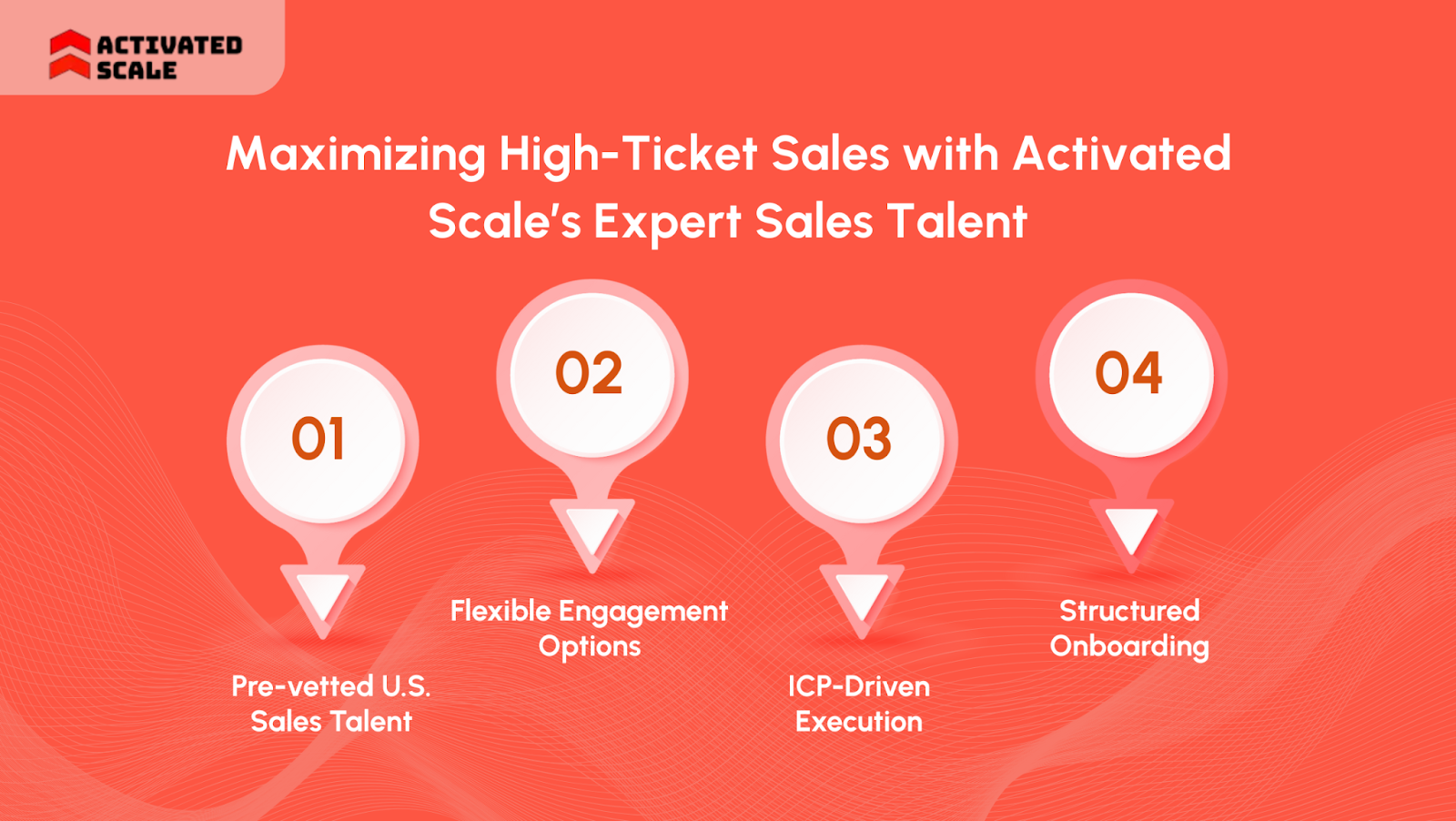
High-ticket sales management tools organize complexity, track touchpoints, and surface insights, but they don’t close deals on their own. The right sales professional not only executes but also identifies the tools best suited for your business and sets up scalable processes that grow with your team.
That’s where Activated Scale comes in. We connect startups and B2B companies with pre-vetted, U.S.-based SDRs, AEs, and VPs of Sales, helping teams scale high-ticket sales without the risks of premature full-time hires.
Here’s how we make that happen:
- Pre-vetted U.S. sales talent: SDRs, AEs, and sales leaders experienced in complex, high-ticket motions.
- Flexible engagement options: from fractional SDR support to contract-to-hire AEs, customized to your growth stage.
- ICP-driven execution: aligning every activity with your ideal buyer profile for better lead quality and conversions.
- Structured onboarding and fast ramp-up: clear processes that keep outsourced sales talent productive from day one.
Tools provide visibility, but skilled people turn those insights into revenue. By combining sales platforms with the right talent, we give startups and B2B companies a faster, smarter way to win in high-value markets.
Conclusion
High-ticket sales management tools simplify complex deals, provide clear visibility, and help teams act on critical insights.
However, real results come when these platforms are paired with skilled sales professionals who understand high-value buyer journeys and know how to turn data into revenue. Strategic adoption, combined with the right talent, is key to boosting performance.
If you’re looking to scale high-ticket sales without the risk of premature hires, Activated Scale connects you with experienced, flexible sales teams ready to drive results efficiently.
Book a call with us today to see how our sales teams can help you scale high-ticket deals efficiently.
FAQs
- How do high-ticket sales management tools support remote teams?
Cloud-based tools with mobile access and real-time collaboration keep distributed sales teams connected. They allow updates, deal tracking, and coordination without delays, ensuring complex sales progress smoothly.
- What role do sales intelligence tools play?
Sales intelligence provides insights on prospects, like company news, financials, and decision-maker activity. Integrating these with CRM helps teams target opportunities strategically and engage in informed conversations.
- What are the costs of implementing these tools?
Pricing varies by features, team size, and customization needs. Consider subscription fees, training, and integrations to ensure the tool fits your business efficiently.
- How can startups quickly get support for high-ticket sales without hiring full-time staff?
Activated Scale connects startups with pre-vetted, U.S.-based SDRs, AEs, and sales leaders. This allows companies to scale high-value sales efficiently, get immediate expertise, and avoid the risk of hiring before the team is ready.
The Ultimate Guide to Hiring a Salesperson!
Get the step-by-step guide to hiring, onboarding, and ensuring success!
_edi.png)
